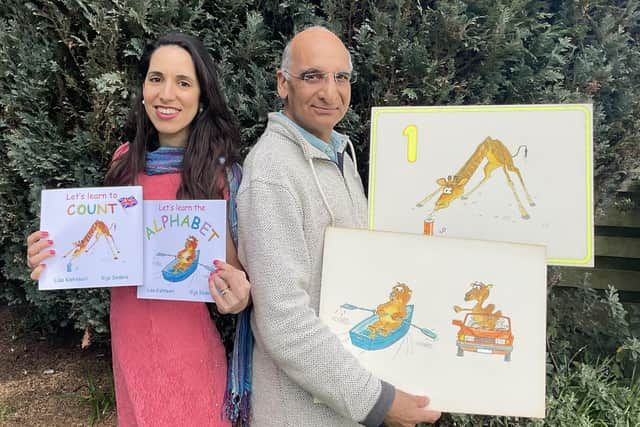Father-daughter duo in Bognor Regis create picture books in over 25 different languages
This article contains affiliate links. We may earn a small commission on items purchased through this article, but that does not affect our editorial judgement.
and live on Freeview channel 276
The series, which is available on Amazon, teaches children the alphabets and numerical systems of 25 different languages – everything from Spanish to Persian– using a range of cute characters and illustrations to make learning fun.
It all comes from the mind of Dr Vija Sodera, who ran his own skin surgery clinic and worked at the Bognor War Memorial hospital for many years'. He devised the characters years ago, in order to teach his children their ABCs and 123s, and his now adult daughter Lisa Kishtwari is working to share them with the world.
Advertisement
Hide AdAdvertisement
Hide Ad"He somehow found the time when we were children to create these characters, and he wanted to write a book, but it never really went anywhere,” she explained. “Nowadays, he doesn’t have the time to do it himself because he’s so busy, but I just didn’t want his hard work to be wasted, I wanted to bring these characters to life.


The project has a special place in Lisa’s heart because, despite growing up in a biracial household, she never got a chance to learn Punjabi, her father’s native tongue, and wants other children to stay connected to their roots.
“In each book, we include a little map of the country where the language comes from, to help them learn a little bit more about the background. It’s like a little keepsake, or a memento.”
Each book is produced via consultation with an actual native speaker of the language in order to ensure they are as accurate as possible. This approach, alongside Lisa’s wide range of contacts, has empowered the pair to cover a range of unexpected – but no less worthwhile – languages, including Jamaican Patois and Yoruba.
Advertisement
Hide AdAdvertisement
Hide AdAmong the languages included in the books so far is Ukrainian, which Lisa hopes will be of great help to the children of refugees displaced by the fighting. “I think it will be for the next generation,” she said. “The hope is, of course, that they get to home. But some might stay here, and they could potentially lose their mother tongue. This is a means through which they can stay in touch with their heritage.”